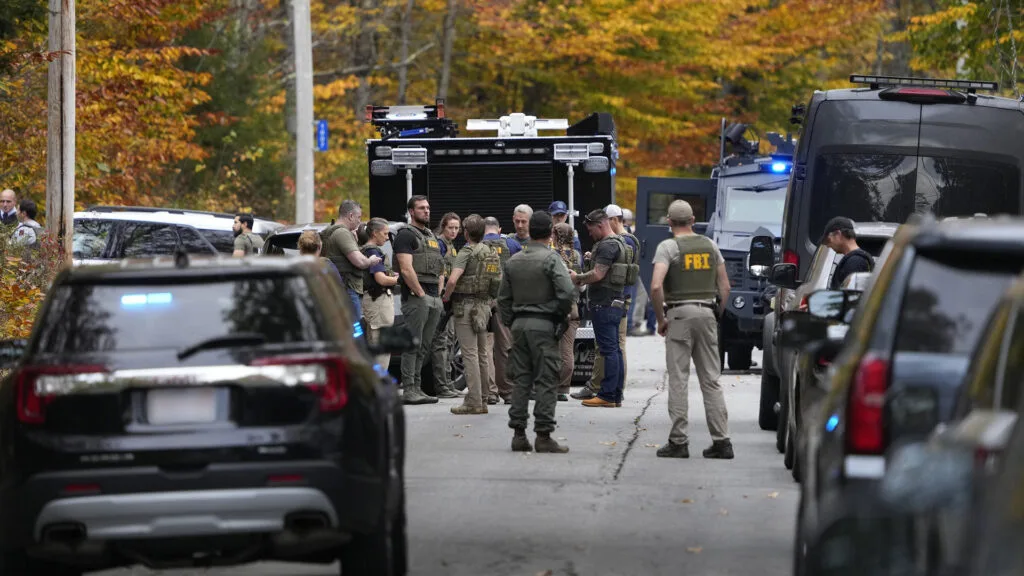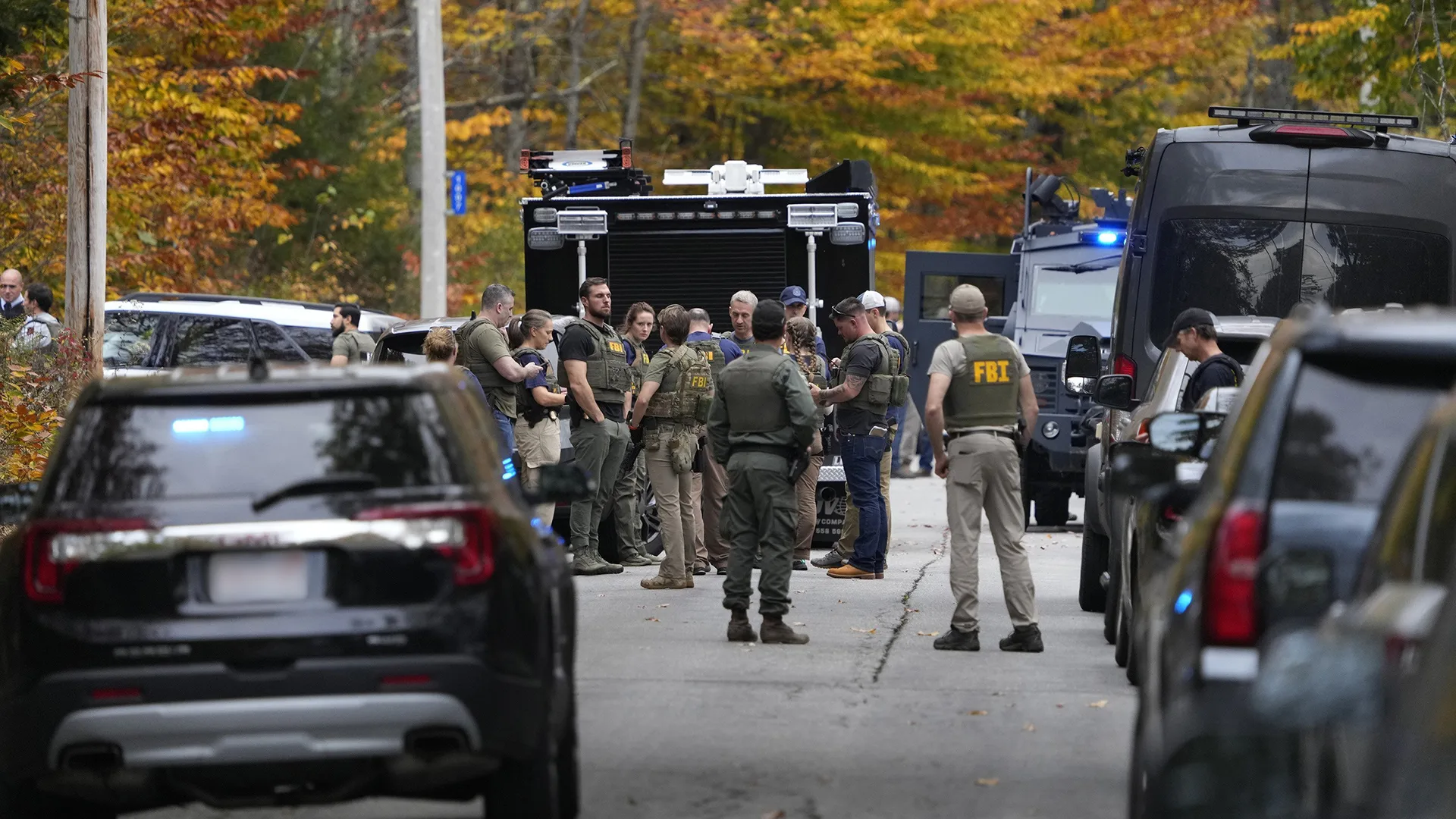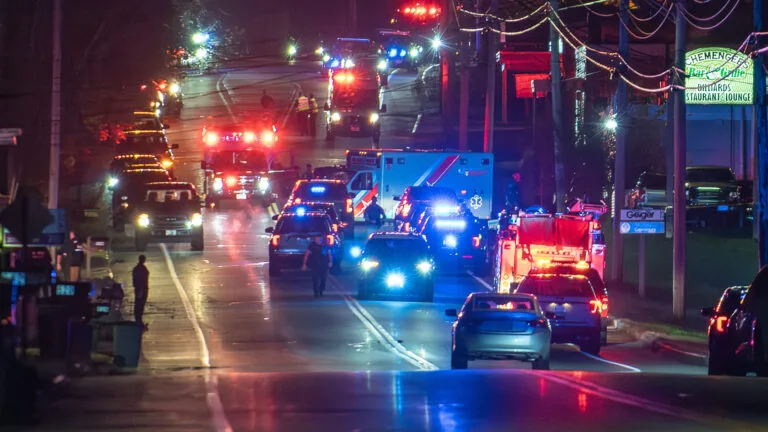There Were Warnings. Why Wasn’t the Shooter in Lewiston, Maine Stopped?
December 10, 2024
Share
Less than four months before the October 2023 mass shooting in Lewiston, Maine, which claimed 18 lives, members of the gunman’s Army Reserve unit were alarmed by his behavior.
He seemed to be hearing voices. He was showing what one fellow reservist called “paranoia to the Nth degree.” And shortly after arriving at his annual Army Reserve training that July, he had tried to fight a fellow soldier and then locked himself in his room.
Concerned about his deterioration, Robert Card’s fellow reservists at West Point in New York called the police. As the above video, drawn from the new documentary Breakdown in Maine, recounts, Card’s fellow soldiers were very worried about what might happen next.
“Our concern is that he’s either going to hurt himself or someone else,” one reservist told New York state troopers. “He needs to be evaluated. He needs to talk to a medical professional.”
“I don’t know what he’s capable of,” another reservist told the troopers. “I’m not insinuating anything, but I’m just saying he does have a ton of guns, OK?”
It was just one in a series of warnings laid out in Breakdown in Maine, a joint investigative film from FRONTLINE and its Local Journalism Initiative partners the Portland Press Herald and Maine Public. The full documentary, premiering on Dec. 10, examines a series of missteps by the military, law enforcement and mental health providers before the deadliest mass shooting in Maine’s history. The result of more than a year of reporting on the Lewiston massacre and its aftermath, the documentary was produced alongside the Portland Press Herald’s in-depth stories and an ongoing limited-series podcast from Maine Public.
“There were breakdowns on a whole lot of levels,” Portland Press Herald reporter John Terhune says in the documentary. “It wasn’t one mistake. It wasn’t one person, wasn’t one institution.”
The video drawn from the documentary shows how one of those missed opportunities to stop the gunman unfolded. That July day, Card told state police that his fellow soldiers were “scared. Because I’m going to friggin’ do something, because I am capable.” He would be taken to Keller Army Community Hospital and diagnosed with “unspecified psychosis,” and then transferred to Four Winds, a nearby civilian hospital, for a higher level of psychiatric care.
There, Card’s troubling behavior continued.
“First and foremost, Card talks about having a hit list and he thinks about adding people that have aggrieved him to this hit list,” Terhune says in the video. While in the hospital, Card told a friend that he was “playing the game” — making his doctors think he was improving so they would let him leave.
He was released after 19 days.
Listen: Breakdown: Turning Anguish Into Action (podcast series)
No one from Four Winds or Keller Army Community Hospital would agree to an interview. Testifying before a state commission investigating what led to the shootings, a Keller Hospital psychiatric nurse practitioner said he told Army Reserve Capt. Jeremy Reamer that Card was unfit for duty. The nurse said he had recommended to Reamer he take steps to remove Card’s weapons, check in regularly and ensure he attended his mental health treatment appointments.
That did not occur, as Reamer testified before the state commission.
“I personally did not follow up with him regarding that,” Reamer said in testimony that appears in Breakdown in Maine.
Reamer wouldn’t agree to an interview for Breakdown in Maine, nor would anyone else in the Army. But in their own internal investigation, the Army acknowledged missteps in communication and followup — areas they said they have since improved — while also criticizing police and civilian medical personnel involved in the case. The Army also stressed that they only have limited authority over reservists when they return to civilian life. Reamer testified to the state commission that those limits especially apply to “certain things like firearms, having no jurisdiction or authority over his personally owned firearms.”
Read more: How Maine’s Novel ‘Yellow Flag’ Law Endured After the Lewiston Mass Shooting
Reamer also told commissioners that he had been in touch with Card’s friend, and that he believed there was an agreement for the family to remove Card’s guns from his home.
“What we know is that these guns were not secured upon Robert’s release from the hospital,” Terhune says in the video. “It never ended up happening.”
For the full story, watch Breakdown in Maine and explore related reporting from the Portland Press Herald and Maine Public — including video episodes of the Breakdown podcast interpreted into American Sign Language that will soon be available for streaming. The multiplatform investigation examines the devastating impact of the shooting, including on Maine’s Deaf community, which lost four people that day. It probes Maine’s unique gun laws and details the shooter’s brain injuries, possibly sustained during his time as an Army grenade instructor. And it offers in-depth accountability reporting about a tragedy that might have been preventable.
“There are countless instances where, if things were done a little bit differently, this may not have happened,” says Maine Public reporter Steve Mistler.
Breakdown in Maine will be available to watch at pbs.org/frontline and in the PBS App starting Dec. 10, 2024, at 7/6c. It will premiere at 10/9c on PBS stations (check local listings), at mainepublic.org and pressherald.com, and on FRONTLINE’s YouTube channel at 10/9c. The documentary is a FRONTLINE Production with Storyboard Studios LLC. The director is Bronwyn Berry. The producer is James Blue. The writers are Bronwyn Berry & James Blue. The journalists from the Portland Press Herald are Julia Arenstam and John Terhune; and from Maine Public, Steve Mistler and Susan Sharon. The CEO and Publisher of the Maine Trust for Local News/Portland Press Herald is Lisa DeSisto. The President and CEO of Maine Public is Rick Schneider. The senior editor of FRONTLINE’s Local Journalism Initiative is Erin Texeira. The editor-in-chief and executive producer of FRONTLINE is Raney Aronson-Rath.
The documentary and related reporting are part of FRONTLINE’s Local Journalism Initiative, an innovative effort to support and amplify investigative reporting in local newsrooms around the country. LJI launched in 2019 with funding from the John S. and James L. Knight Foundation and the Corporation for Public Broadcasting and is based in FRONTLINE’s newsroom at GBH in Boston.

Related Documentaries
Latest Documentaries
Related Stories
Related Stories
Explore
Policies
Teacher Center
Funding for FRONTLINE is provided through the support of PBS viewers and by the Corporation for Public Broadcasting, with major support from Ford Foundation. Additional funding is provided the Abrams Foundation, Park Foundation, John D. and Catherine T. MacArthur Foundation, Heising-Simons Foundation, and the FRONTLINE Trust, with major support from Jon and Jo Ann Hagler on behalf of the Jon L. Hagler Foundation, and additional support from Koo and Patricia Yuen. FRONTLINE is a registered trademark of WGBH Educational Foundation. Web Site Copyright ©1995-2025 WGBH Educational Foundation. PBS is a 501(c)(3) not-for-profit organization.
























